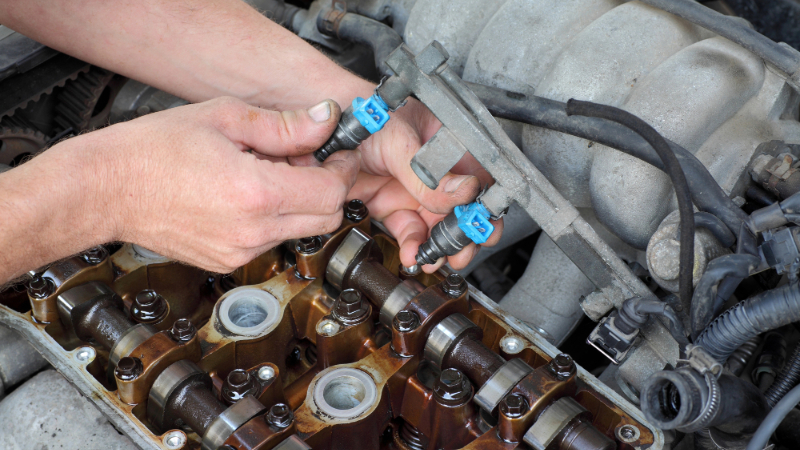Fuel Injector Replacement Cost

Your vehicle’s engine is fed fuel by a system of pumps, valves, and injectors, all of which must work properly and in concert in order for your car to run properly. When one of the components fails, the car will run poorly or not at all. A critical part of the system is the bank of fuel injectors that deliver the fuel to the intake side of the engine or directly to the combustion chamber. If an injector fails, the cost can be from $350 to as much as $1,200. However, it is important to realize that the cost is for one injector. Your car may have many.
What is a Fuel Injector and What Does It Do?
The fuel injector is one of the last parts of your fuel delivery system prior to combustion inside the cylinders. It helps to meter and atomize the fuel and allow it to mix properly with the intake air. This fuel-air mixture is what your engine converts to energy in the engine.
There are multiple types of fuel injection, and some vehicles even have more than one type. Port, Throttle, and Direct are the main types of fuel injection in today’s modern engines. Each has its own way of creating the fine mist of fuel that your car will need to run properly.
How Long Should a Fuel Injector Last?
Fuel injectors are designed to last the life of the vehicle. They very often do so. There is no routine maintenance required by most manufacturers to keep your fuel injectors working properly. It is very rare for an injector to fail inside of the vehicle’s limited or powertrain warranty, but if that happens, it is typically covered under warranty.
Is My Fuel Injector Covered By My Extended Warranty?
If you have an extended warranty purchased from your manufacturer or a third party, a failed fuel injector may be covered under the policy you own. If you purchased the top-tier level of protection, it almost certainly will be. Consult your contract for details.
How Do I Know if I Need a Fuel Injector Replaced?
- Signs of a faulty fuel injector include the following:
- Check Engine Light
- Car runs roughly or poorly
- Car won’t restart
- Misfiring, which will result in a Check Engine Light
Why Did My Fuel Injector Fail?
Fuel injectors operate under pressure, and they are both mechanical and electric components (electromechanical). They can fail due to defects in manufacturing or workmanship. They may also be damaged or blocked by contaminants. As we mentioned above, most manufacturers do not require any routine maintenance or cleaning of the fuel injectors in your vehicle.
Do I Need To Replace All of My Fuel Injectors If One Fails?
Your car likely has multiple fuel injectors. If one is broken, your mechanic will typically only replace the one that has failed. An exception may be if the fuel system suffered from some sort of contamination.
Must I Replace a Faulty Fuel Injector?
A failed fuel injector must be replaced for the vehicle to run properly. Failure to replace a failed fuel injector can result in further engine damage.
Can I Drive With a Faulty Fuel Injector?
If your car has any of the symptoms of a failed fuel injector, we recommend that you take it directly to a nearby shop or have the vehicle towed if the shop is far from your location.
Can My Fuel Injector Be Cleaned Or Repaired Instead Of Replaced?
Fuel injection cleaning is possible. Many shops recommend it in order to boost profits and to give owners a sense of having done something beneficial for the engine. However, cleaning a fuel injector and resolving one that has failed are not really related.
A fuel injector is not a part that a mechanic will try to repair. Instead, the part will be replaced.
Who Can Replace My Fuel Injector?
Any qualified mechanic in a professional shop can replace your fuel injector. We recommend a trusted shop, but dealers can certainly handle this job. However, expect to pay 30% to 50% more for the same result compared to a trusted local shop.
Can I Replace My Own Fuel Injector?
Car Talk does not recommend that vehicle owners work on the fuel system of their own vehicles. There is a risk of fire, injury or death, and of contamination to the area. Fuel is under high pressure in modern engines.
What Does It Cost to Replace a Fuel Injector?
Since there are many types of fuel injection systems, it is hard to predict what the cost to replace an injector will be. Our research suggests that prices to replace a single injector range from about $350 to about $1,200. If you own an affordable mainstream vehicle model built in high volumes, the price will be lower than if you drive a rare high-performance vehicle. Remember, if your car is still under any of its warranties, your first step should be to find out if this repair will be covered.
Read more on the topic of Owning a Car here.


















